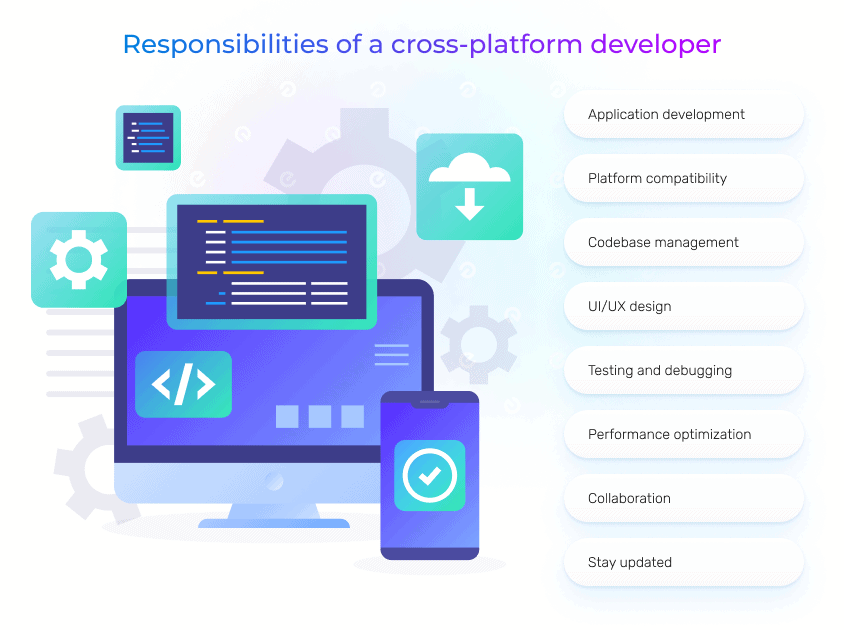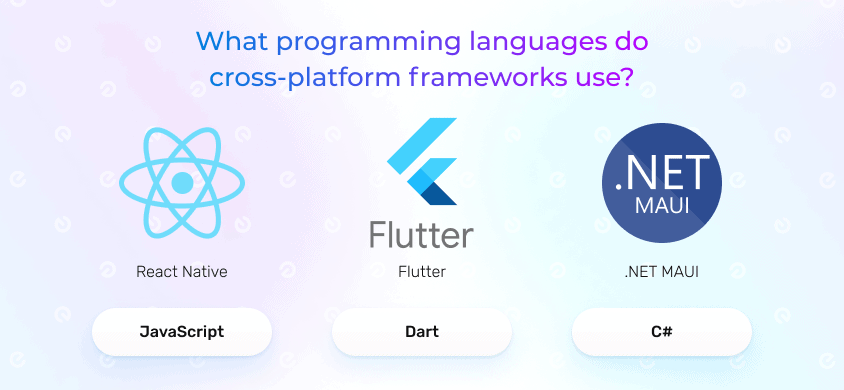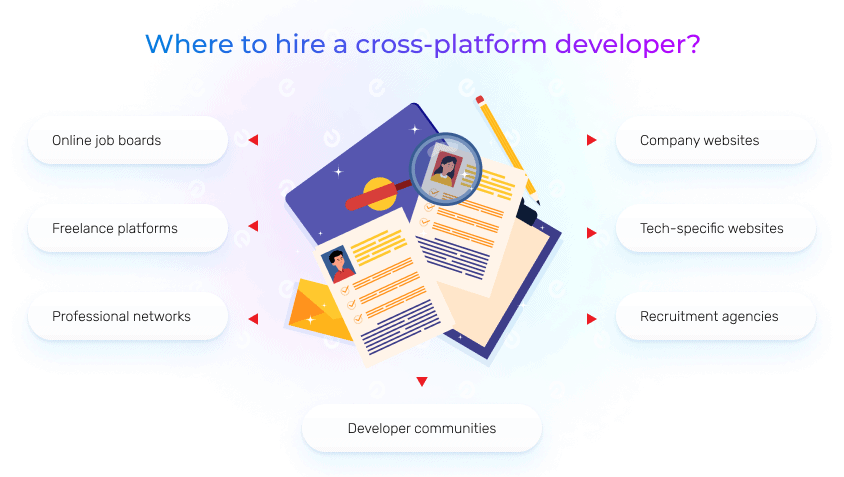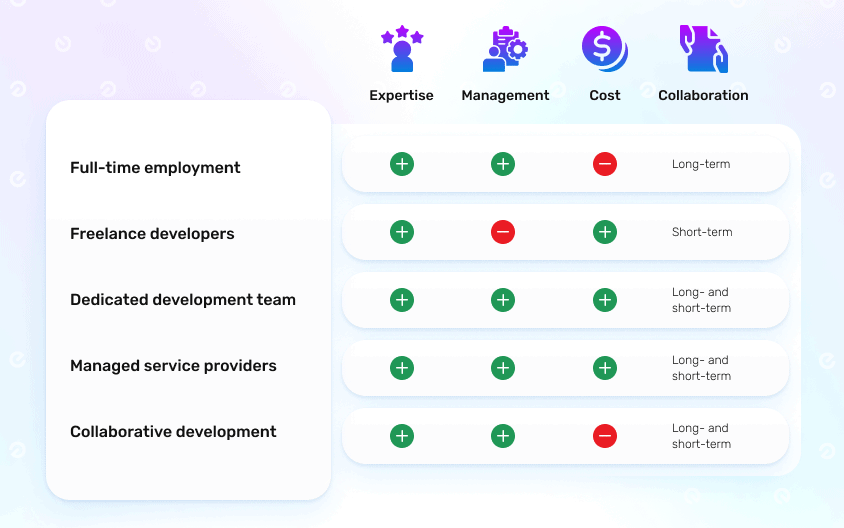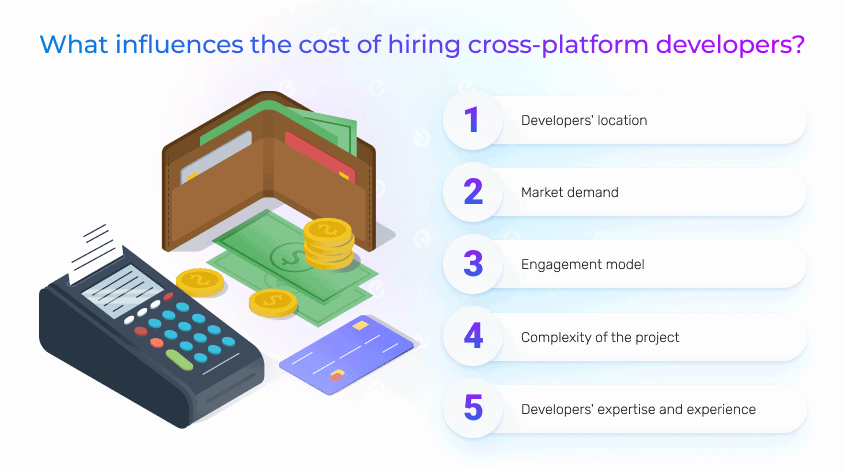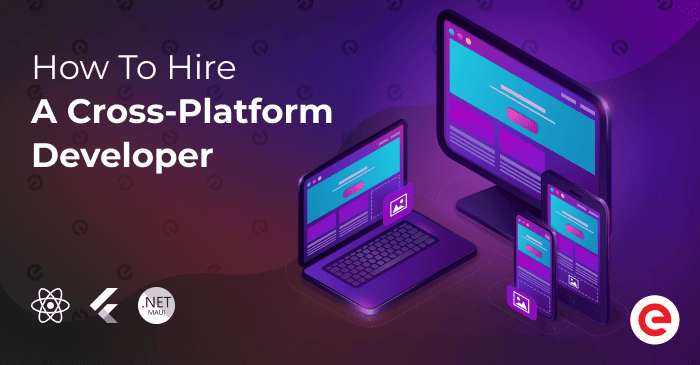
Updated: May 1, 2024
Published: June 14, 2023
Over recent years, cross-platform app development has gained tremendous popularity and brought reasonable solutions for numerous companies. If you get to the point of creating an app for your business, why not consider this efficient development approach? This blog post provides a comprehensive guide on what decisive aspects to focus on, how to hire a cross-platform developer, and what benefits to gain.
List of the Context
- Why hire a cross-platform developer?
- Roles and responsibilities of a cross-platform developer
- Requirements to hire a cross-platform app developer
- Where to hire a cross-platform developer?
- How to hire a cross-platform app developer: engagement models?
- How much does it cost to hire a cross-platform developer?
- Conclusion
WHY HIRE A CROSS-PLATFORM DEVELOPER
When it comes to the choice of efficient development approaches, cross-platform app development maintains a top position in the market trends. Many businesses have already found it a viable option to implement outlined solutions and reach a broad customer audience on multiple platforms. It not only provides great functionality and tools but also simplifies the development process.
At the same time, the important aspect of completing successful projects also depends on hiring the right developers. That’s why we’d like to discuss this point in more detail and provide a complete guide on how to hire a cross-platform developer. Let’s start with the point of what compelling reasons to think of when hiring cross-platform app developers. It’s a known fact that choosing a cross-platform developer to implement your project can offer several advantages.
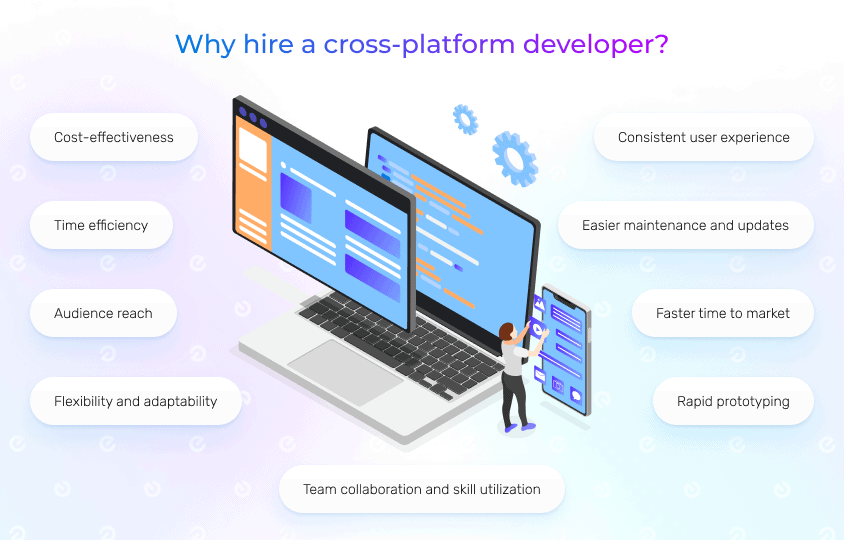
- Time efficiency: With cross-platform developers, you can significantly reduce the time required to build an app. Since they are working on a single codebase, updates, and bug fixes can be implemented more efficiently across all platforms simultaneously.
- Audience reach: By introducing a cross-platform app, you can reach a larger audience since your solution will be available on multiple platforms. This can be particularly beneficial if you’re targeting users across different devices and operating systems.
- Consistent user experience: Cross-platform frameworks like React Native, Flutter, and .NET MAUI provide tools and libraries that help maintain a consistent user experience across different platforms. This ensures that your app looks and feels the same, regardless of the operating system or device used.
- Easier maintenance and updates: With a single codebase, maintaining and updating the app becomes simpler. Changes can be made once and applied to all platforms, reducing the effort and resources required for ongoing maintenance.
- Faster time to market: Collaborating with cross-platform specialists allows businesses to launch their products faster since they’re building apps for multiple platforms simultaneously. This can be crucial in competitive markets where time to market can make a significant difference.
- Team collaboration and skill utilization: It’s worth mentioning that cross-platform developers specialize in different technologies; thus, it supports the opportunity to leverage various frameworks from project to project. This means companies can utilize a larger pool of developers who have experience with required technologies, enabling better collaboration within your development team.
- Flexibility and adaptability: Cross-platform development enables easier integration with existing systems and services. It also provides the flexibility to adapt and scale your app across different platforms as your business needs evolve.
- Rapid prototyping: This development approach facilitates rapid prototyping, allowing the team to quickly validate your app idea and gather user feedback. By building a functional prototype for multiple platforms simultaneously, businesses can iterate and refine their concept more efficiently.
While engaging with cross-platform developers has its benefits, it’s necessary to consider the specific requirements of each project and evaluate business needs. It’s always recommended to consult with experienced developers to set the proper requirements.
Would you like to find more details about cross-platform app development?
This article provides details on this development approach and how to leverage it efficiently for your business.
ROLES AND RESPONSIBILITIES OF A CROSS-PLATFORM DEVELOPER
Cross-platform developers are professionals who specialize in creating applications running on multiple platforms, such as desktop computers, mobile devices, web browsers, embedded devices, etc. Their roles and responsibilities commonly vary depending on the specific project and organization, but here are some common tasks and expectations:
Application development
Cross-platform developers design and develop software applications that can be deployed across multiple platforms. They typically work with frameworks, tools, and programming languages that facilitate cross-platform compatibility, such as React Native, .NET MAUI, Flutter, etc.
Platform compatibility
When you hire a cross-platform developer, they take the responsibility to ensure that the application works seamlessly on different operating systems, devices, and screen sizes. They need to understand the strengths and limitations of each platform and optimize the application’s performance accordingly.
Codebase management
Cross-platform developers strive to maintain a single codebase used across multiple platforms, reducing development time and effort. They need to manage and organize the codebase effectively, keeping it modular and reusable.
UI/UX design
Cross-platform app developers collaborate with designers to create intuitive and visually appealing user interfaces that are consistent across platforms. They must ensure a smooth user experience, taking into account platform-specific design guidelines and interaction patterns.
Testing and debugging
It is the responsibility of cross-platform specialists to test the application thoroughly on different devices and platforms, identifying and resolving any compatibility issues, bugs, or performance bottlenecks. They may use testing frameworks, emulators, or physical devices for comprehensive testing.
Performance optimization
When hiring a cross-platform developer, they need to optimize the application’s performance to ensure smooth and responsive user experiences across platforms. This includes efficient memory management, network optimization, and leveraging platform-specific capabilities when necessary.
Collaboration
Developers often work in cross-functional teams, collaborating with other developers, designers, project managers, and stakeholders. Effective communication and teamwork are crucial for understanding project requirements, managing expectations, and delivering high-quality applications.
Stay updated
Given the constantly evolving nature of platforms and technologies, cross-platform developers should stay up-to-date with the latest developments, frameworks, and best practices in the field. This enables them to make informed decisions, leverage new features, and maintain the competitiveness of their applications.
Overall, the roles and responsibilities of cross-platform specialists revolve around creating high-quality, cross-platform applications that provide a consistent and engaging user experience while leveraging the strengths and specifications of each target platform.
REQUIREMENTS TO HIRE A CROSS-PLATFORM DEVELOPER
It goes without saying that specific requirements always vary depending on the project’s scope and the organization’s needs. Defining clear expectations and evaluating candidates based on their alignment with those requirements is crucial. Properly understanding developers’ roles and responsibilities and gathering project-specific needs help impose well-outlined requirements. Let’s mention some common requirements when you need to hire a cross-platform developer.
Development expertise: Look for candidates with a strong background in cross-platform development. They should have experience working with popular cross-platform tools and frameworks like React Native, Flutter, .NET MAUI, etc.
Programming languages: Proficiency in programming languages relevant to cross-platform development is essential. Depending on the chosen framework, these may include JavaScript, C#, or Dart.
Platform-specific knowledge: While cross-platform developers aim to create applications that work on multiple platforms, it’s beneficial if they have familiarity with the major platforms they will be targeting, such as iOS, Android, and web browsers. Understanding platform-specific guidelines, APIs, and best practices can greatly enhance the quality and performance of the applications.
UI/UX design skills: A good cross-platform developer should have a solid understanding of user interface and user experience design principles. They should collaborate effectively with designers to create visually appealing and user-friendly interfaces that are consistent across platforms.
Problem-solving and debugging abilities: The development process often involves troubleshooting and debugging issues that may arise on different platforms. Seek candidates who are skilled at identifying and resolving problems efficiently, as well as optimizing performance, and addressing compatibility challenges.
Testing and quality assurance: It’s important to hire a cross-platform developer with experience testing cross-platform applications. They should be familiar with testing frameworks, tools, and techniques for ensuring functionality, compatibility, and performance across platforms.
Communication and collaboration: Strong communication skills are important for cross-platform developers, as they often work as part of a team. They should effectively communicate project requirements, collaborate with designers and other developers, and provide regular updates on progress.
Portfolio and experience: Assess a candidate’s previous work and experience in cross-platform app development. Review their portfolio, projects they have worked on, and any relevant applications they have built. This can help gauge their skills, problem-solving abilities, and the quality of their work.
Continuous learning: App development is a rapidly evolving field, so look for candidates willing to learn and stay updated on the latest trends, frameworks, and technologies. They should proactively expand their knowledge and keep up with industry advancements. Additionally, certifications in cross-platform frameworks or platforms can validate a candidate’s expertise and commitment to professional growth.
WHERE TO HIRE A CROSS-PLATFORM DEVELOPER?
When you decide to hire a cross-platform developer, it’s essential to clearly define your project needs, assess candidates’ technical skills, review their previous work, and conduct interviews to ensure a good fit for your team and project. It’s great that, nowadays, businesses can explore various avenues and platforms that cater to hiring technical professionals. Here are some popular options:
Online job boards: Indeed, LinkedIn and Glassdoor are well-known platforms for posting job listings and finding qualified candidates. The company can specify its requirements for a cross-platform developer and review resumes or portfolios of interested candidates.
Freelance platforms: Upwork, Freelancer, and Toptal offer access to a large pool of freelance developers. It’s easy to post project requirements, review proposals, and hire developers based on their expertise and past work.
Developer communities: Online communities like GitHub, Stack Overflow, and Reddit have dedicated sections or job boards where developers actively participate. The team can engage with the community, post your requirements, and connect with cross-platform developers who have relevant experience.
Professional networks: Leverage the professional network on platforms like LinkedIn or attend relevant tech conferences and meetups. Networking can help your team find experienced cross-platform developers or get referrals from industry connections.
Company websites: Visit the websites of software development agencies or companies specializing in cross-platform development. Many of them have dedicated career pages or contact information where you can inquire about hiring developers.
Tech-specific websites: Explore websites and forums that focus on cross-platform development technologies like React Native or Flutter. These platforms often have job boards or sections where developers interested in these technologies can be found.
Recruitment agencies: Also, businesses can consider partnering with technical recruitment agencies or headhunters that specialize in hiring software developers. They can help them source, screen, and interview cross-platform developers based on project-specific requirements.
Looking for a professional software development company?
Feel free to contact Existek. We’re an offshore software development company with first-and expertise in cross-platform development. Our team of experts knows how to turn your brilliant ideas into functional and beautiful solutions to attract your customers.
HOW TO HIRE A CROSS-PLATFORM DEVELOPER: ENGAGEMENT MODELS
Besides knowing the options where to hire a cross-platform developer, teams have to select the right engagement model. Depending on project requirements, budget, and timeline, companies have the opportunity to choose among several engagement models.
Full-time employment
Provided that teams hire a cross-platform developer as a full-time employee, it offers the advantage of having dedicated resources working exclusively on your project. You can advertise the job opening, conduct interviews, and make a direct employment offer. This model provides better control and flexibility over the development process, but it also involves long-term commitments and additional costs like employee benefits and office space.
Freelance developers
Platforms like Upwork, Freelancer, and Toptal can connect you with a pool of cross-platform developers. Freelancers that work on a project basis offer flexibility in terms of project duration and cost, but you need to closely manage their work and ensure their availability throughout the project.
Would you like to learn more about the difference between hiring dedicated developers vs. freelancers?
We recommend that you check our article to compare these engagement models comprehensively and help your team choose the best option based on your needs.
Dedicated development team
This model allows businesses to hire a dedicated development team or a remote software development company specializing in cross-platform development. This team will work exclusively on your project, following your requirements and timeline. The advantage is having a committed team with the required expertise, infrastructure, and project management capabilities. It is a suitable model for long-term projects or when they require continuous development and maintenance.
Managed service providers
That’s an engagement model with end-to-end solutions for cross-platform development. They handle the entire development process, from planning and design to implementation and maintenance. It’s suitable when companies want to outsource the entire project or specific components to an experienced team. Managed service providers can also offer ongoing support and maintenance services.
Collaborative development
This model involves partnering with another organization or developer that specializes in app development. It allows you to leverage their expertise and resources while sharing the workload and responsibilities. Collaborative development can be done on a project-by-project basis or as a long-term partnership.
Before finalizing an engagement model, the team has to consider numerous factors, including the complexity of your project, budget constraints, desired level of control, and the specific skills and experience required. It’s also important to thoroughly evaluate the expertise, portfolio, and reputation of the developers or companies they consider for hire.
HOW MUCH DOES IT COST TO HIRE A CROSS-PLATFORM DEVELOPER?
When companies decide to hire a cross-platform app developer, it commonly involves various cost considerations depending on factors that impact the final cost. Let’s look at some additional details to help teams understand the cost range:
- The expertise and experience of a cross-platform developer significantly influence their rates. Developers with several years of experience and a proven track record in cross-platform development frameworks like React Native or Flutter will generally command higher rates due to their specialized skills and knowledge.
- Development rates can vary based on the location of the professional. Rates in countries with a higher cost of living, such as the United States, United Kingdom, or Australia, tend to be higher than those with lower living costs, such as Poland, Ukraine, or Mexico. This difference in rates can be attributed to the local economic factors and market demand for cross-platform developers.
- The complexity of your project plays a significant role in determining the cost. Projects with complicated features, advanced functionalities, or tight deadlines may require developers with higher skill levels, which can result in higher costs. Additionally, if the project requires integration with complex systems or third-party services, it may require more specialized expertise, impacting the overall cost.
- The cost of hiring a cross-platform developer can also depend on whether you choose an individual developer or a development agency. Freelancers generally have lower rates compared to agencies, but agencies often provide additional services such as project management, quality assurance, and a team of experts. These added benefits can justify the higher rates charged by service providers.
- The prevailing market demand for cross-platform developers in your region or industry can impact pricing. In highly competitive markets with a scarcity of skilled professionals, the cost to hire a cross-platform developer may be higher. Conversely, in areas with a larger pool of available developers, rates may be more competitive.
- The hiring model you opt for can affect the cost structure. The option to hire a cross-platform developer on a full-time basis typically involves a higher cost compared to part-time or project-based contracts. Full-time employment often includes benefits and additional expenses associated with long-term commitments, while part-time or project-based contracts offer more flexibility but may have higher hourly rates.
In terms of hourly rates, they can vary significantly based on the factors mentioned above. On average, you can expect rates to range from $30 to $150 or more for cross-platform developers. These are only approximate rates and can vary considerably depending on the aforementioned factors and market conditions.
How to make your project estimates?
We suggest checking a detailed guide on estimating software projects in man-hours and finding practical advice.
CONCLUSION
The decision to hire a cross-platform developer should be driven by a clear understanding of the specific needs and goals of your business. Whether you’re a startup looking to establish a strong presence in the market or an established enterprise seeking to streamline your development process, a cross-platform developer can offer invaluable insights and technical prowess.
When searching for a cross-platform developer, prioritize individuals with a solid background in relevant technologies such as React Native, Flutter, or .NET MAUI. Look for candidates that possess first-hand experience in delivering high-quality applications across multiple platforms. Additionally, consider their ability to adapt to new technologies and stay updated with the latest industry trends. It always is essential to find someone who can effectively collaborate with the team, manage project timelines, and provide regular updates on the development progress.
While hiring a cross-platform developer may require an initial investment, the long-term benefits outweigh the costs. Businesses can ensure they remain competitive in a rapidly changing technological landscape, delivering superior user experiences while minimizing development and maintenance efforts.
How to hire cross-platform developers?
Existek is an offshore software development company specializing in providing full-cycle services. We’ll gladly offer our assistance whether you’d like to hire a cross-platform developer or set up a cross-functional team.
Frequently asked questions
Why hire a cross-platform developer?
Potential benefits like cost-effectiveness, time-saving, wider audience reach, faster deployment, and others make hiring a cross-platform developer a strategic choice for businesses aiming to develop applications for multiple platforms efficiently and cost-effectively.
Where to hire a cross-platform developer?
Businesses can hire a cross-platform app developer through several options, including
Online job boards
Freelance platforms
Developer communities
Professional networks
Company websites
Tech-specific websites
Recruitment agencies
What are the popular engagement models for hiring cross-platform developers?
The known engagement models cover
Full-time employment
Freelance developers
Dedicated development team
Managed service providers
Collaborative development
What is the hourly cross-platform developer hourly rate?
The hourly rate for a cross-platform developer can vary depending on different factors, including their experience, location, the complexity of the project, etc. The average hourly rates range from $30 to $150 per hour.

